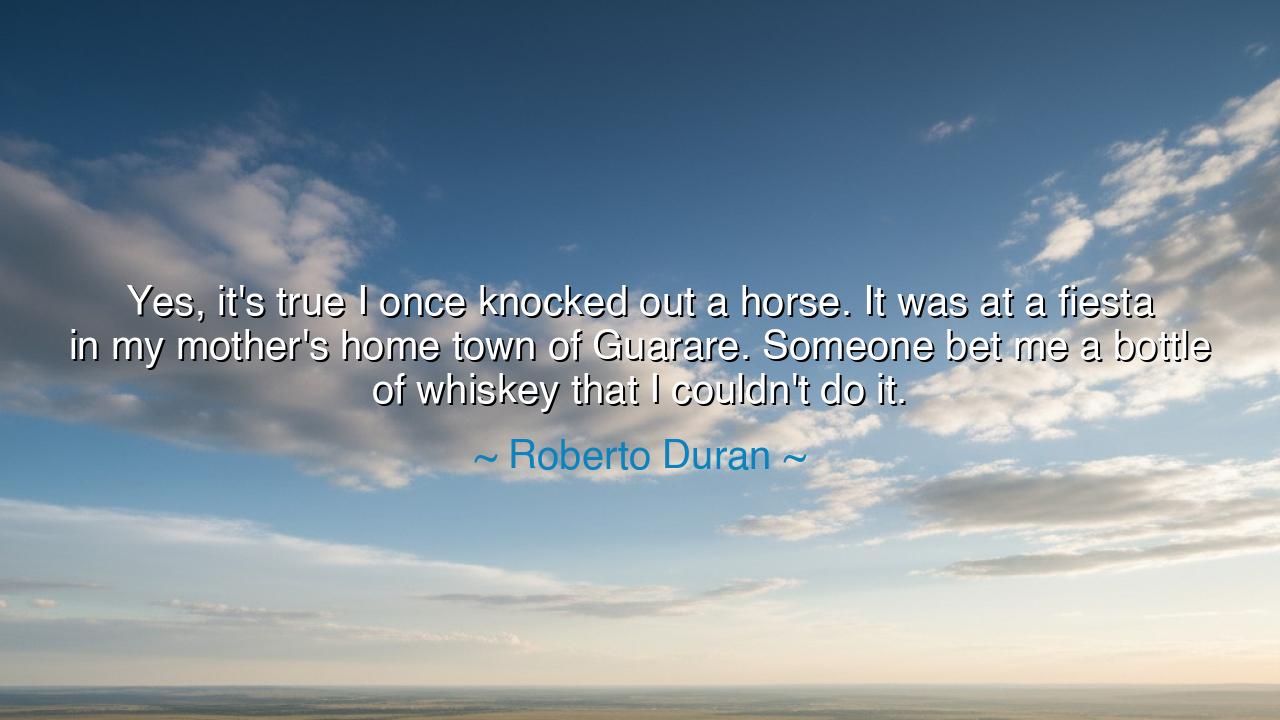
Yes, it's true I once knocked out a horse. It was at a fiesta in
Yes, it's true I once knocked out a horse. It was at a fiesta in my mother's home town of Guarare. Someone bet me a bottle of whiskey that I couldn't do it.






In the bold and unforgettable words of Roberto Durán, the legendary fighter of Panama, there lives a tale both fierce and symbolic: “Yes, it’s true I once knocked out a horse. It was at a fiesta in my mother’s home town of Guararé. Someone bet me a bottle of whiskey that I couldn’t do it.” To the unwise, this may sound like mere bravado—a wild boast from a man of fists and fury. But to those who listen with the ears of the ancients, there lies within this confession a mythic pulse, the echo of a man’s struggle with strength itself—the measure of his will, his pride, and his humanity.
Durán, known to the world as “Manos de Piedra,” the Hands of Stone, was no ordinary fighter. He was born in poverty, forged in the streets, and tempered in the fire of hunger. His fists were his weapon, but his soul was his forge. When he speaks of striking a horse, he speaks not only of physical might but of the unyielding spirit that dares to test its own limits. To strike a beast stronger than oneself is to confront the mystery of power—to ask, “How much force lies within me? How much courage, how much madness?” In this act, Durán became not just a man but a symbol of willpower made flesh.
The horse, throughout history, has been a creature of great meaning. It is the emblem of nobility, speed, and untamed energy. To conquer it, even for a foolish bet, is to engage with something primal—the raw contest between man and nature, between instinct and control. From the ancient Scythians to the Mongol riders of Genghis Khan, men have sought to master the horse, for in doing so they mastered a piece of their own wildness. Thus, when Durán raised his hand against the horse of Guararé, he was reenacting an ancient drama: the struggle between power and restraint, between pride and consequence.
In his life as a boxer, this same fire drove him to greatness. He fought as though every blow were the answer to life’s injustice. Against Sugar Ray Leonard, Ken Buchanan, and Iran Barkley, his hands struck with the same fury that felled the horse of his youth. But that fury, unbridled, could also destroy. When he turned away from Leonard in the infamous “No Más” fight, he faced not an opponent but himself. In that moment, Durán learned that the strength that conquers others is nothing compared to the strength required to conquer one’s own pride.
Thus, his tale at Guararé becomes more than legend—it becomes parable. The bet for a bottle of whiskey, a trivial prize, reveals a deeper truth: that men often test their power not for necessity, but for the thrill of affirmation. We seek proof that we are strong, alive, unbreakable. Yet, the wise know that true power is not in striking, but in knowing when not to strike. The horse, noble and innocent, becomes the mirror of human vanity. Durán’s punch is a reminder that the same force that builds champions can also bring regret.
But let us not condemn the act—let us learn from it. For in the young Roberto Durán, we see the reflection of all who rise from hardship and dare to test fate. He reminds us that strength must be tempered by wisdom, that passion must serve purpose, and that every gift bears responsibility. The man who can knock out a horse must also learn to lift a friend, to defend the weak, to fight not for whiskey or glory, but for meaning.
So take this lesson, O seeker of power: know your strength, and know its cost. Do not use it to prove, but to protect. Do not waste it in the noise of pride, but wield it in silence for justice and truth. The spirit of Durán speaks through the ages—not as the tale of a brute, but as the awakening of a warrior who learned that the fiercest battles are not fought with fists, but within the heart.
And when you stand before your own “horse”—the challenge that seems greater than you—strike not in arrogance, but in clarity. Remember the lesson of the Hands of Stone: that true might is not measured by what you can destroy, but by what you choose to preserve.






AAdministratorAdministrator
Welcome, honored guests. Please leave a comment, we will respond soon